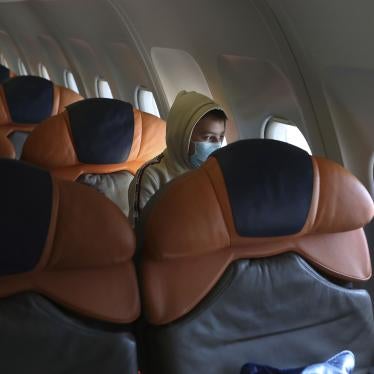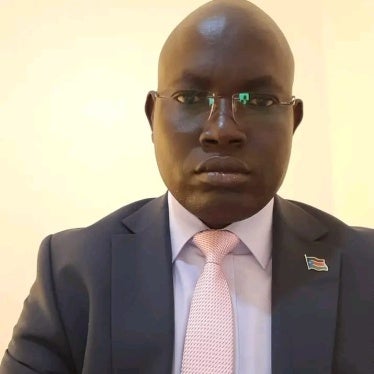H.E. Turki al-Sudairy
Chairman
Human Rights Commission
P.O. Box 58889
Riyadh 11515
Kingdom of Saudi Arabia
Your Excellency,
Thank you for your November 18, 2008 (20/11/1429) letter and the accompanying memorandum by the Council of Ministers’ Bureau of Experts regarding Saudi Arabia’s policies on the placement of boys under age 18 in juvenile detention centers. Human Rights Watch appreciates the Human Rights Commission’s assistance in clarifying Saudi Arabia’s regulations and practices affecting the children in conflict with the law, particularly as it affects the most vulnerable groups of children, among them those under age 12 .
We write now to draw your attention to policies cited in the memorandum by the Council of Ministers’ Bureau of Experts that fall short of Saudi Arabia’s legal obligations under the Convention on the Rights of the Child. We also request clarification of the terms of the November 2008 Shura Council decision raising the age of majority in Saudi Arabia to 18, as discussed below.
Minimum Age of Criminal Responsibility
Human Rights Watch is concerned that Saudi Arabian regulations and practice continue to subject young children to arrest, detention, and custodial sentences in violation of international juvenile justice standards. The UN Convention on the Rights of the Child, to which Saudi Arabia is a state party, requires a state to set a minimum age of criminal responsibility (MACR), below which they cannot formally charge children with a criminal offense or hold them responsible under the penal law (art. 40(3)(a)). The UN Committee on the Rights of the Child, the authoritative body that monitors the convention's implementation, has concluded that "a minimum age of criminal responsibility below the age of 12 years is considered by the Committee not to be internationally acceptable."
Saudi Arabian authorities have repeatedly stated that the kingdom sets 12 years as the minimum age of criminal responsibility. In March 2008, Ministry of Social Affairs officials meeting with Human Rights Watch reiterated this position, while adding that this minimum age only applied to boys, and no minimum age existed for girls. In fact, the policies set out in the memorandum by the Council of Ministers’ Bureau of Experts explicitly allow for detention, trial, and custodial sentences for boys under age 12, stating:
3. Juveniles who commit one of the major crimes or who are sentenced to prison in one of such crimes and who are under age 12 shall be placed in a social observation home (dar al-mulahatha al-ijtima`iya) until the end of their period of detention or the implementation of their sentence.
5. The agency responsible for the prosecution of juvenile cases—and in particular cases of those who are under age 12—shall request the judge to consider alternative punishments to imprisonment.
On June 25, 2008, the newspaper Arab News reported that police at the al-Ajyad station in Mekka had arrested a nine-year-old boy (“Musa”) and his father after the boy allegedly stabbed an older boy in the thigh; and that the authorities then transferred the boy to the Jeddah juvenile detention center (“The youngest criminal arrested in Makkah,” Arab News, June 25, 2008). The same article states “Maj. Abdul Muhsin Al-Mayman, official spokesman for Makkah Police….complimented the police for quickly arresting the father and son.”
Human Rights Watch calls on the government of Saudi Arabia to:
•Enact, publicize, and enforce legislation clearly specifying a minimum age of criminal responsibility no lower than 12 years for both girls and boys.
•Review all cases of persons in custody who were under age 12 at the time of the alleged offense, with a view to their immediate release to guardians or transfer to other appropriate care.
•Train police, prosecutors, and judges on the impermissibility under international law of criminal prosecutions against persons under age 12 at the time of the alleged offense.
Age of Majority
According to press reports, on November 24, 2008 Saudi Arabia’s Shura Council issued a decision declaring a unified age of majority of 18 years for both criminal and civil matters (Huda Salih, “The Saudi Shura Decides to Raise the Ceiling of Childhood to 18 Years,” Al-Sharq al-Awsat newspaper, November 25, 2008). Human Rights Watch welcomes efforts to bring Saudi Arabian legislation into compliance with international human rights standards, which provide special protections for persons under age 18. We would be grateful for clarification of how this decision will affect the situation of persons who are facing trial for or have been convicted of capital offenses and who were under age 18 at the time of the alleged offense.
As Your Excellency is aware, Saudi Arabian courts have repeatedly treated as adults persons who were under age 18 at the time of the alleged offense, including in capital cases. In several cases these rulings have been based on a judge’s assessment of the child’s physical development, in keeping with a 2002 Council of Senior Scholars decision that a child attains majority when any one of four conditions are met: completing 15 years of age; occurrence of wet dreams (al-ihtilam); appearance of pubic hair; or upon menstruation (Council of Senior Scholars Decree 209 of January 23, 2002 (9/11/1422)).
Such decisions are contrary to international standards, which call upon states to make determinations of adult competence based on "emotional, mental and intellectual maturity," and not the child's physical maturity (UN Standard Minimum Rules for the Administration of Juvenile Justice, rule 4). When these decisions result in death sentences, they also violate Saudi Arabia’s legal obligations under the Convention on the Rights of the Child, which requires states to ensure that no one is sentenced to death for an offense committed while under age 18 (art. 37(a)). Saudi Arabia executed at least two such juvenile offenders in 2007—Dhahiyan bin Rakan bin Sa`d al-Thawri al-Sibai`i, and Mu`id bin Husayn bin Abu al-Qasim bin `Ali Hakami—making it one of only five countries in the world known to have executed someone for a crime committed while a child since January 2005. Human Rights Watch is aware of several other persons who are currently on trial or have been issued death sentences for crimes allegedly committed while they were children.
Human Rights Watch calls on the government of Saudi Arabia to:
•Clarify publicly that the Shura Council decree setting the age of majority at 18 years, once enacted as law by the Council of Ministers, applies to all criminal offenses, including murder, and refers to the individual’s age at the time of the alleged offense, rather than at the time of trial, sentencing, or implementation of sentence.
•Enact legislation banning the imposition of capital punishment on persons who were under 18 at the time of the crime.
•In the case of existing death sentences passed on persons who were under 18 at the time of the crime, immediately commute those sentences to custodial or other sentences in conformity with international juvenile justice standards.
Your Excellency, as you know, many parties are concerned about children’s rights in the kingdom’s criminal justice system, but your Commission’s submission to the Human Rights Council for Saudi Arabia’s Universal Periodic Review in February 2009 did not dwell on the impact of the age of majority for measures regarding detention or the juvenile death penalty. Human Rights Watch would be grateful for your assistance in conveying our concerns, and our request for clarification, to the Council of Ministers and the relevant ministries. We look forward to receiving your reply.
Sincerely,
Clarisa Bencomo
Researcher
Children’s Rights Division






